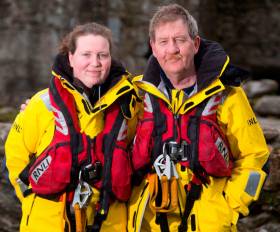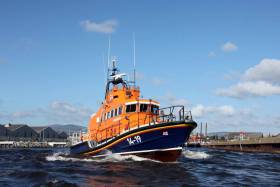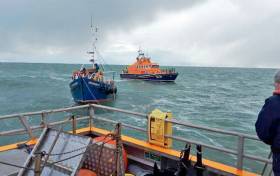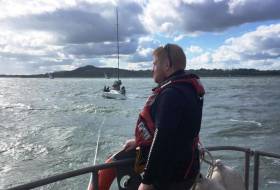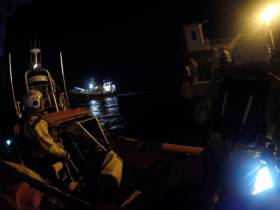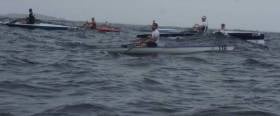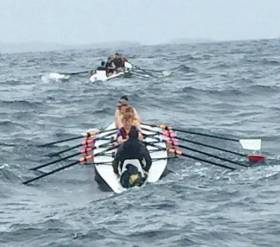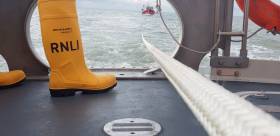Displaying items by tag: Arklow
Ireland Women Qualify for A Finals at World Coastal Championships
#Rowing: Five Ireland entrants in the women’s solo single made it through heats into Sunday’s A Final of the World Coastal Rowing Championships in Hong Kong. Miriam Sheehan of Castletownbere placed best, taking third in the first heat, one place ahead of Sionna Healy. The Arklow sculler was one of three from her club to make it to the A Final in this class. Both women’s coxed quadruples, from Belfast and a composite of Castletownbere and Myross, also qualified for the A Final.
The Ireland men’s crews found the going tougher. Only the top five in the heats of the men’s double were guaranteed places in the A Final. John Whooley and Alan Goodison finished sixth in their heat - making it through. The three other Ireland crews missed out.
World Coastal Rowing Championships, Hong Kong – Day One, Heats (Ireland crews)
Men
Double (Five to A Final) – Heat One: 6 Arklow 19:04.39; 10 St Michael’s, Dublin 21:28.54.
Heat Three: 8 Kilmacsimon/Ring 21:15.37; 11 Courtmacsherry 22:53.45.
Women
Quadruple, coxed (Eight to A Final) – Heat One: 7 Belfast BC 19:33.28.
Heat Two: 7 Castletownbere/Myross 20:40.31.
Solo (Eight to Final) – Heat One: 3 Castletownbere (M Sheehan) 22:07.48; 4 Arklow (S Healy) 22:16.07; 7 Galley Flash (N Hayes) 23:13.68; 8 Arklow (MA Kent) 24:41.77.
Heat Two: 6 Arklow (X Jordan) 24:02.30.
Arklow Lifeboat Helps Three On Broken-Down Fishing Boat Ahead Of Search For Kayaker
Arklow RNLI launched twice on Wednesday (21 August), first to go the aid of three onboard a broken down boat and later to search for a kayaker reported missing.
The volunteer crew were first requested to launch their all-weather lifeboat by the Irish Coast Guard at 1pm on Wednesday, Arklow RNLI says.
The Ger Tigchelaar was launched to reports of a fishing vessel with three aboard which had lost propulsion and was adrift one mile north-east of Arklow Harbour.
In south-westerly Force 4-5 winds and with moderate worsening sea conditions, the casualty vessel was located and, once on scene, Arklow RNLI volunteers secured a rescue towline and proceeded to tow the fishing vessel back into Arklow where all hands came ashore safely.
The second call out came later that evening at 6.20pm when reports had come in that a person was missing on a kayak somewhere north of Arklow.
The crew launched the lifeboat immediately and commenced a search. As they proceeded north along the coast, further reports came in that a kayak had been sighted on or near the beach at Ennereilly Strand, north of Arklow.
The lifeboat continued the search north as it headed for the reported position at Ennereilly.
In the meantime, some of Arklow RNLI’s volunteers had commenced a shoreline search to see if the person had managed to get ashore separate from the kayak.
A short time later, another volunteer located the owner of the kayak who had made his way ashore quite safely and was en route back to Ennereilly Strand to pick up his kayak.
The search was then stood down and the lifeboat returned to station.
Following the callouts, Arklow RNLI press officer Mark Corcoran said: “Thankfully, we were able to bring three people safely back to shore and given the worsening conditions and with the casualty vessel adrift near the rocks this could easily have had a much worse ending.
“Our second launch in more challenging conditions followed a report of a missing kayaker — thankfully he had made it back to shore safely and was en-route back to collect his beached kayak when he was located on shore.
“Thanks to the members of the public who made the report and all of our volunteers for their time in challenging conditions and a special thanks and congratulations to Sinead Myler on completing her first call out today.”
It was a busy weekend for RNLI lifeboats in Arklow, Larne and Kilmore Quay which each had callouts over the Easter period.
Arklow RNLI launched on Sunday afternoon (21 April) to assist a jetski in difficulty following a launch request from the Irish Coast Guard at 3.15pm.
The volunteer lifeboat crew left their families on Easter Sunday to answer the callout, bringing the all-weather lifeboat Ger Tigchlearr just north of Arklow Harbour where the casualty vessel had been reported adrift and without power.
The jetski, with two people aboard, was quickly located off the back of Arklow's North Pier, dangerously close to the rocky shoreline.
The two people aboard were immediately recovered onto the lifeboat and a line was secured to the jetski to tow it back to shore.
In Larne, RNLI volunteers were called out twice on Sunday evening to people in difficulty.
In the first callout, both the all-weather and inshore lifeboats were called to aid two kayakers who had overturned near Browns Bay just off Islandmagee.
Larne RNLI launched into a calm sea at 5,45pm with the inshore lifeboat, Terry, tasked to bring the kayakers safely to shore, while the all-weather lifeboat Dr John McSparran was tasked to recover the kayaks left behind.
After a successful recovery of both casualties and their equipment, Larne RNLI helm Pamela Leitch noted: “The two kayakers were wearing buoyancy aids; they also remembered to stay with their kayaks which made it easier for us to identify them and bring them ashore.”
The second callout involved the all-weather lifeboat towing a 26ft sailing boat which had run aground at the East Maidens lighthouse.
One of the two people onboard had asked to dock close to the Maidens so they could have a look around. However, while they were the docked the tide ebbed and the boat was left on rocks.
The remaining crew member was able to use their VHF radio to call for assistance from Belfast Coastguard, who requested the launch of the all-weather lifeboat.
When Larne’s volunteers reached the boat, they found that it had moved off the rocks and that no damage had occurred to the hull.
However, it was suggested that the casualty boat follow the all-weather lifeboat into Larne to assess any further damage.
As both boats were making their way into the Port of Larne, a tow line was established as the casualty vessel was experiencing some engine troubles. The vessel was then towed to a mooring at East Antrim Boat Club.
Meanwhile, in Kilmore Quay, the local RNLI lifeboat was alerted by Dublin Coast Guard at 5.25pm that an 11m boat with two people on board had lost engine power three-and-a-half miles south of Bag-N-Bun Head to the west of Kilmore Quay.
Conditions were near calm at the time with restricted visibility due to coastal fog. Visibility was down to one tenth of a mile at times.
The volunteer crew made best speed towards the casualty vessel, arriving alongside twenty minutes later. A tow line was passed over and the vessel was towed back to Kilmore Quay, which took just under an hour to complete.
The four Easter Sunday callouts came after Saturday launches for Courtmasherry RNLI, to a Spanish-bound yacht in distress, and Carrybridge RNLI, to two boats in difficulty on Upper Lough Erne.
“Given the fantastic weather we’ve had this weekend, we’ve seen higher numbers of people coming back to the beaches and putting their boats and other craft back in the water, earlier than usual,” said Mark Corcoran, community safety officer at Arklow RNLI.
“We’d like to remind people to always respect the water, wear a lifejacket and carry a means of calling for help when going out on the water.”
#Lifeboats - Arklow RNLI launched on Tuesday (2 April) to assist a vessel in distress following a request from the Irish Coast Guard and a pager alert at 3.20pm.
The volunteer crew left their jobs and normal workday behind and within minutes of the alert were aboard the lifeboat Ger Tigchlearr and under way to the reported position, some nine miles south east of Arklow and close to the offshore Arklow sand banks.
The casualty boat, a fishing vessel, had reported engine failure and was adrift, unable to anchor.
As the lifeboat made its way to the location, fellow Arklow RNLI coxswains and crew members who were at work aboard a wind turbine transfer and maintenance vessel heard the radio request for assistance.
The work vessel was closer to the stricken fishing boat, which was by now approximately half a mile from the sandbanks and in real danger of being wrecked in the prevailing westerly wind and moderate sea conditions.
Following a consultation with the lifeboat coxswain, the workboat crew were able to get a line safely aboard the vessel and tow it away from the sandbanks for a time.
As this was in progress, the lifeboat arrived on scene and its crew set up their own tow to bring the vessel and three aboard back home to Arklow.
Following the callout, Mark Corcoran, community safety officer at Arklow RNLI, said: “Thanks to the quick thinking and actions of our volunteers who were at work on the wind turbine vessel, Arklow RNLI was in the happy position to tow this fishing vessel and her crew of three to safety.
“We would remind people to respect the water and always wear a lifejacket and carry a means of calling for help when going out on the water.”
#Rowing: Ireland crews reached multiple A Finals and had two fifth-place finishes at the World Coastal Rowing Championships in Sidney, Victoria in Canada.
The Myross men’s coxed quadruple of Kenny McCarthy, Vincent Browne, Andy O’Sullivan and James Lupton, with cox Ciara Deasy, finished fifth in their A Final. The race was won by Italy, who were well clear of second-placed Monaco, with France One taking bronze.
In the final of the men’s single, Patrick Boomer was also well placed behind the winner Eduardo Linares Ruiz. The Peruvian took the lead before half way and held on to dethrone Italy’s defending champion, Simone Martini, who took bronze. Lars Wichert of Germany was second.
Boomer, who was representing Loughros Point of Donegal, was fifth, well in touch with the medallists.
Ireland's women's crews also did well. Castletownbere's coxed quad of Emily Dulohery, Cliona O'Regan, Orla Gilsenan, Miriam Sheehan and cox Carmel Connolly finished sixth. Russia won from Spain and Monaco.
Diana Dymchenko of the Ukraine won the women’s single. Sionna Healy of Arklow was eighth and Laura O’Neill of Kilmacsimon 12th.
World Coastal Rowing Championships, Sidney, Victoria, Canada (Selected Results; Irish interest)
Men
Quadruple, coxed: 1 Italy (CC Saturnia) 22 mins 14 secs, 2 Monaco, 3 France One; 5 Myross, Ireland (K McCarthy, V Browne, A O’Sullivan, J Lupton; cox: C Deasy) 23:46.9.
Single: 1 Peru (E Linares Ruiz) 26:30.2, 2 Germany Two, 3 Italy; 5 Ireland One, Loughros Point (P Boomer) 27:23.4.
Women
Quadruple, coxed: 1 Russia 25:18.0, 2 Spain One, 3 Monaco; 6 Castletownbere, Ireland (E Dulohery, C O’Regan, O Gilsenan, M Sheehan; cox: C Connolly) 27:56.
Single – 1 Ukraine (D Dymchenko) 28:56.7, 2 Netherlands, 3 France Two; 8 Ireland One (S Healy, Arklow) 31.38.2; 12 Ireland Three (L O’Neill, Kilmacsimon) 33:25.1.
Arklow Lifeboat Rescues Four In Busy Early October Weekend
#Lifeboats - Arklow’s volunteer RNLI crew rescued four people in two separate callouts over the weekend.
The first launch was on Saturday afternoon (6 October) to a yacht which had gotten into difficulty and was without power about one mile east of Arklow harbour.
Three crew and their vessel were towed safely back to Arklow.
The second callout came in the early hours of Sunday morning (7 October) when the Arklow lifeboat launched at 2.30am to a report of a person in the water in the harbour.
Thanks to witnesses on scene as well as local gardaí and coastguard officers, the casualty was located and thrown a life ring to keep them afloat till the lifeboat arrived minutes later.
Once out of the water, the casualty was taken to hospital by ambulance.
“We would like to extend our thanks to the members of the public who alerted the coastguard and the local gardaí to this incident,” said Mark Corcoran, community safety officer at Arklow RNLI.
“Without this early call for help and assistance during the rescue, this callout could have ended very differently.”
Arklow RNLI reminds the public to people to respect the water – always wear a lifejacket and to carry a means of calling for help when going out on or near the water.
Weekend Callouts For Arklow & Skerries Lifeboats To Fishing Vessels In Difficulty
#Lifeboats - Arklow RNLI’s all-weather lifeboat crew left their Sunday lunch on 23 September to attend to a fishing vessel in difficulty east of Cahore Point in Co Wexford.
Once the vessel and its crew of three were located, it was established that while it had power, it could not make any headway due to its propeller being fouled with fishing gear.
The lifeboat volunteers rigged a tow line and set up for a long slow tow home to Arklow. All hands came ashore safely some five hours later.
Mark Corcoran, community safety officer at Arklow RNLI, said: “We would like to remind people to respect the water and always wear a lifejacket and carry a means of calling for help when going out on the water.”
The previous evening, Skerries RNLI was tasked to another fishing vessel which suffered mechanical failure and lost engine power less than half a mile north of Skerries harbour.
The struggling 22m fishing boat, with a crew of seven on board, was well lit and visible from the shore so the Atlantic 85 lifeboat Louis Simson made its way quickly alongside.
With the fishing vessel drifting dangerously close to the shore, it was decided to establish a tow to bring safely alongside the harbour.
Speaking about the callout, volunteer lifeboat press officer Gerry Canning said: “This was quite a large vessel for us to take under tow, but the conditions were very fair on the night and the Atlantic 85 was very much up to the job.”
Arklow Big Winners at Irish Coastal Rowing Championships
#Rowing: Myross won the men’s quadruple, while Sionna Healy of Arklow took the women’s single on the second day of the Irish Offshore Rowing Championships in Kerry. It was a good event overall for Arklow. They won the men’s and women's doubles on Saturday, while on Sunday – which featured races deferred because of disruptive winds – they won the mixed doubles, through Alan Goodison and Andrea Kinsella.
Irish Offshore Championships, Kerry
Saturday
Men
Double: Arklow (J Whooley, A Goodison) 20.17.
Single: Loughros Point, Donegal (P Boomer).
Women
Quadruple: Killorglin (E O’Donovan, A Tyther, K Boyle, R O’Donoghue; D Leahy) 22:48.
Double: Arklow (R Ireson, MA Kent).
Sunday
Men
Quadruple: Myross (V Browne, K McCarthy, J Lupton, A O’Sullivan; C Deasy) 17:12.
Women
Single: Arklow (S Healy) 24:32.
Mixed
Double: Arklow (A Goodison, A Kinsella) 18:53.
Boomer Best at Offshore Rowing Championships
#Rowing: Patrick Boomer won the single sculls at the Irish Offshore Championships at O’Carroll’s Cove near Caherdaniel in Kerry. Boomer represented Loughros Point in Donegal and hopes to go on to row for them at the World Coastal Rowing Championships in Canada in October.
John Whooley of Skibbereen won a title – for Arklow. The Corkman teamed up with Alan Goodison to take the men’s double.
Kerry club Killorglin won the women’s quadruple and Arklow the women’s double.
The final of the men’s quadruple, the women’s single and the mixed double will take place on Sunday as the wind made conditions unsuitable on Saturday.
Irish Offshore Championships, Kerry
Men
Double: Arklow (J Whooley, A Goodison) 20.17.
Single: Loughros Point, Donegal (P Boomer).
Women
Quadruple: Killorglin (E O’Donovan, A Tyther, K Boyle, R O’Donoghue; D Leahy) 22:48.
Double: Arklow (R Ireson, MA Kent).
Early Start For Arklow Lifeboat To Fishing Vessel In Difficulty
#RNLI - Following a pager alert by the Irish Coast Guard at 7.28am yesterday morning (Monday 27 August) Arklow RNLI’s all-weather lifeboat was launched to reports of a fishing vessel in difficulty.
Within a few minutes, the Ger Tigchelarr and her volunteer crew were en route to the casualty vessel some four miles south of Arklow.
Once on scene, the volunteer lifeboat crew were able to ascertain that the vessel had suffered machinery failure and needed assistance.
A tow line was set up and the vessel and its crew of three was towed back to Arklow where all hands came ashore safely.
Following the callout, Arklow RNLI community safety officer Mark Corcoran said: “Following these incidents, it’s important to stress to all who go on or in the water the importance of having a means of calling for help. The earlier our crews can get to the casualty, the better the outcome.”


























